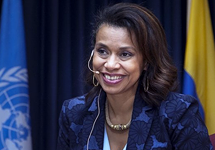August 11, 2020

Elayne Whyte Gómez
The James Martin Center for Nonproliferation Studies (CNS) is pleased to announce that H.E. Elayne Whyte Gómez of the Costa Rican Ministry of Foreign Affairs, Strategic Futures Group, has joined the CNS International Advisory Council as its newest member.
An alumna of the Middlebury Institute of International Studies at Monterey (MIIS), Ambassador Whyte is an accomplished diplomat and prominent leader in the international community. Most notably, she successfully presided over the 2017 negotiations at the United Nations of the Treaty on the Prohibition of Nuclear Weapons. Facing extraordinary time pressure and, at times, contentious debate, Ambassador Whyte facilitated the adoption of this landmark agreement by a vote of 122 nations in favor, one against, and one abstention.
As the commencement speaker to the 2017 graduating class of MIIS, Ambassador Whyte reflected on her years as a graduate student in the Master of Arts in International Policy and Development (MAIPS). “We wanted to change the world,” said Ambassador Whyte of herself and her classmates who graduated from MIIS in 1993. This motivation continues to fuel her diplomatic engagement: “It is especially when we are navigating turbulent waters, that we have to walk with hope, and act with hope,” she said.
Among her many accomplishments, Ambassador Whyte is also the first woman and the youngest person ever to serve as vice minister of foreign affairs for Costa Rica.
“It is with sincere pleasure that we welcome Elayne back ‘home’ to CNS as a member of our esteemed International Advisory Council,” said Dr. William C. Potter, CNS founding director. “Her diplomatic acumen, tenacity, and skills will be a tremendous asset to CNS as we continue to expand our efforts at training and educating the next generation of nonproliferation specialists.”
The International Advisory Council is a prominent body of experts that lends its diverse and informed perspectives to the activities of CNS.
